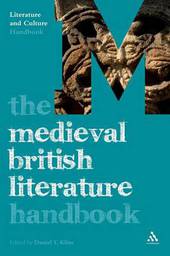
|
The Medieval British Literature Handbook
Paperback / softback
Main Details
| Title |
The Medieval British Literature Handbook
|
| Authors and Contributors |
Edited by Professor Daniel T. Kline
|
| Series | Literature and Culture Handbooks |
|---|
| Physical Properties |
| Format:Paperback / softback | | Pages:328 | | Dimensions(mm): Height 234,Width 156 |
|
| Category/Genre | Literary studies - classical, early and medieval |
|---|
| ISBN/Barcode |
9780826494092
|
| Classifications | Dewey:820.9001 |
|---|
| Audience | | Professional & Vocational | |
|---|
|
Publishing Details |
| Publisher |
Bloomsbury Publishing PLC
|
| Imprint |
Continuum International Publishing Group Ltd.
|
| Publication Date |
25 June 2009 |
| Publication Country |
United Kingdom
|
Description
Literature and Culture Handbooks are an innovative series of guides to major periods, topics and authors in British and American literature and culture. Designed to provide a comprehensive, one-stop resource for literature students, each handbook provides the essential information and guidance needed from the beginning of a course through to developing more advanced knowledge and skills. Written in clear language by leading academics, they provide an indispensable introduction to key topics, including: * Introduction to authors, texts, historical and cultural contexts * Guides to key critics, concepts and topics * An overview of major critical approaches, changes in the canon and directions of current and future research * Case studies in reading literary and critical texts * Annotated bibliography (including websites), timeline, glossary of critical terms. The Medieval British Literature Handbook is an accessible and comprehensive introduction to literature and culture in the Middle Ages, focusing particularly on Middle English and the period from 1300-1500.
Author Biography
Daniel T. Kline is Professor of English and Director of the Department of English at the University of Alaska Anchorage, USA. He edited Medieval Children's Literature (Routledge, 2003), The Continuum Handbook of Medieval British Literature (Continuum, 2009), and Digital Gaming Re-Imagines the Middle Ages (Routledge, 2014), and co-edited, with Gail Ashton, Medieval Afterlives in Popular Culture (Palgrave, 2012).
Reviews"This breathtakingly encyclopaedic volume breaks the mould of usual pedagogical approaches to medieval British literature. The emphasis is very much on the recent representation of the field: how it has been refracted and constructed through its influential critics over the past thirty years. Entries on key concepts in twentieth-century critical theory importantly demonstrate that both medievalists and modernists inhabit the same critical continuum of reading and arguing about texts. The unique overlapping structure of the chapters means that the volume's contributing scholars revisit the same territory from different perspectives, ensuring that views on such topics as feminist, postcolonial and psychoanalytic criticism, The Book of Margery Kempe, romance, Lollardy and religious writing are not only multifaceted but also engage student readers in processes of active discrimination." - Professor Ruth Evans, Department of English Studies, University of Stirling, UK. "Rivalling a medieval summa in its encyclopaedic scope and glittering specificity, The Medieval British Literature Handbook presents Middle English literature in all of its variegated, hybrid, and genre-bending allure. Just as valuably, from its case studies in criticism to its suggested "Web Quests" for students, the Handbook documents the imaginative and highly interdisciplinary scholarship that Middle English literature has inspired and continues to generate, even as it situates the excitement of medieval studies today along a shifting and permeable boundary between the global cultures of the Middle Ages and the twenty-first century. With The Medieval British Literature Handbook, the "New Middle Ages" has truly arrived!" - Professor Martha Rust, Department of English, New York University, USA. "Kline has assembled an exciting array of both new voices and respected eminent scholars in this thought-provoking and sophisticated-though accessible-gateway to studying medieval British literature. Destined to appeal to students of varying levels, as well as to their professors, the volume demonstrates that there is no monolithic way of reading and interpreting the literature of late medieval Britain. Students are ably led by the energetic and engaged essayists in this unique volume to think in complex ways about theory and medieval literature. The volume invites us to understand both the cultural milieu and the history of its criticism to apprehend medieval literature with some nuance. By providing both vital historical and cultural contexts and explaining the range of current and past critical ways of approaching medieval texts, as well as identifying the major voices in each critical position, Kline and his contributors have offered a clear and valuable guide to how we talk about medieval literature, what questions we might ask, and why. It is at once a handbook of literary theory, its development, and its relationship to medieval literature, and a general literary history of medieval British literature. With some key critical positions, post-colonial theory, for example, discussed from the perspective of several contributors, this cornucopeia of perspectives enriches the texts under consideration and their modern readers. The various chapters accumulate in a deep and satisfying non-linear analysis of how medieval literature is framed and interpreted. The incisive chapter by John Ganim alone justifies having the entire book. This well-conceived work is bound to enhance any medieval British literature course." - Professor Christine M. Rose, Portland State University, USA Reviewed in The Year's Work in English Studies, Volume 90 Contributors to the handbook have creditably examined the threads of modern literary theory that enwrap medieval writing, a prodigious task requiring wide knowledge and acquaintance with intimate detail. -- Studies in Medieval and Renaissance Teaching
|